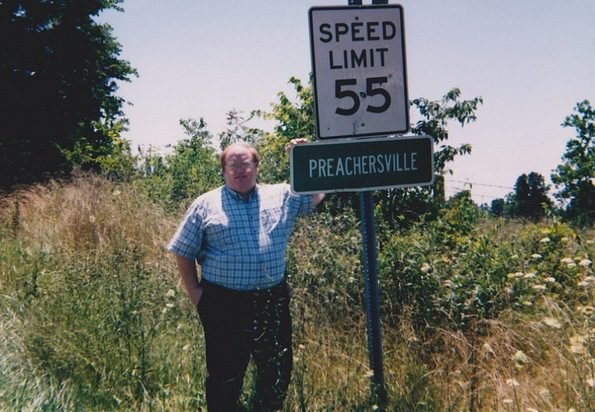
From 1983 to 1994, I pastored Somerset Baptist Church in Mt. Perry, Ohio. A growing Independent Fundamentalist Baptist (IFB) church in the Appalachian region of southeast Ohio, it was here that I learned what it meant to be a pastor; to minister to the least of these. The church grew to 200 in attendance and then suffered a decline in the early 1990s. By then I had started Somerset Baptist Academy — a tuition-free school for church children.
In the mid-1980s, I started a prison ministry, weekly visiting inmates at the Perry County Jail, along with visiting inmates at several state prisons. (Another IFB preacher later ministered with me at the jail. I don’t remember why he stopped doing so.) Every Tuesday I would go to the jail to talk with anyone who wanted to talk with me. I never pushed the gospel or tried to evangelize them. My goal was to befriend these men with no strings attached.
I vividly remember my first time at the jail. The jailer took me to an open place outside where the men were congregated, saying other churches stood there and “preached” to the inmates. (I thought, at the time, you mean preach AT the inmates.) I told the jailer that I would like to visit the men on their side of the bars. The jailer, with a worried look on his face, said, “Are you sure, preacher? What if something happens?” I told him that I would be fine; that I was a big man, and if someone attacked me, I would defend myself. And with that, each week that I came to the jail, the jailer would lock me in with the men, saying, “Bang on the bars when you are ready to go.” Not one time did an inmate threaten me with physical harm. In time, they came to see me as their friend and looked forward to my visits.
I learned about the human condition while ministering to the men at the Perry County Jail. I learned that poverty and substance abuse were never far from these men. Two young men were charged with murder after they, high on drugs, robbed an elderly woman’s home and slit her throat. Another young man was charged with murder after getting into an argument with his best friend over a pizza. Enraged, he killed him with a shotgun. Others were incarcerated for drug crimes, robbery, theft, and domestic violence. Everyone had a story to tell, and I was there to listen, and if asked, pray for them. I tried to help their families on the outside if I could. Not one inmate ever visited the church I pastored, but I took comfort in knowing that I did as Jesus commanded me to do in Matthew 25. Whether I helped effect change in these men is for them to say. I do know, however, that I was a changed man after getting to know them and hearing their stories. What I learned at the Perry County Jail stayed with me even to this day.
I am sure you are wondering about Beavis and Butt-Head. What do they have to do with my work at the Perry County Jail? Beavis and Butt-Head were on the TV every Tuesday. The men loved this show. I never asked them to turn off the TV. While I personally found Beavis and Butt-Head offensive, I was a guest in their home. I learned to tune out the noise as I talked with the men. I never wanted to be THAT preacher; you know the pushy, arrogant pastor who takes offense at everything. The men quickly learned that they could swear around me. I was just one of the guys, albeit without a criminal record. I understood their poverty, having grown up in a dirt-poor home with a drug-addicted mentally-ill mother and a father who paid little to no attention to me. I knew what it was to do without; to move from house to house and school to school.
In the late 80s, a new, cocky sheriff came to town. He threatened me with arrest several times for street preaching. I dared him to do so, knowing the law was on my side. He revoked my jail privileges, and my ministry at the Perry County Jail came to an end. I often wonder what happened to many of those men. The murderers likely were paroled. What became of them? What lives did they live post-prison? I can only hope that I, in a moment of time, was some small help to them; a friendly man who never judged and was ever content to listen.
Bruce Gerencser, 68, lives in rural Northwest Ohio with his wife of 47 years. He and his wife have six grown children and sixteen grandchildren. Bruce pastored Evangelical churches for twenty-five years in Ohio, Texas, and Michigan. Bruce left the ministry in 2005, and in 2008 he left Christianity. Bruce is now a humanist and an atheist.
Your comments are welcome and appreciated. All first-time comments are moderated. Please read the commenting rules before commenting.
You can email Bruce via the Contact Form.
